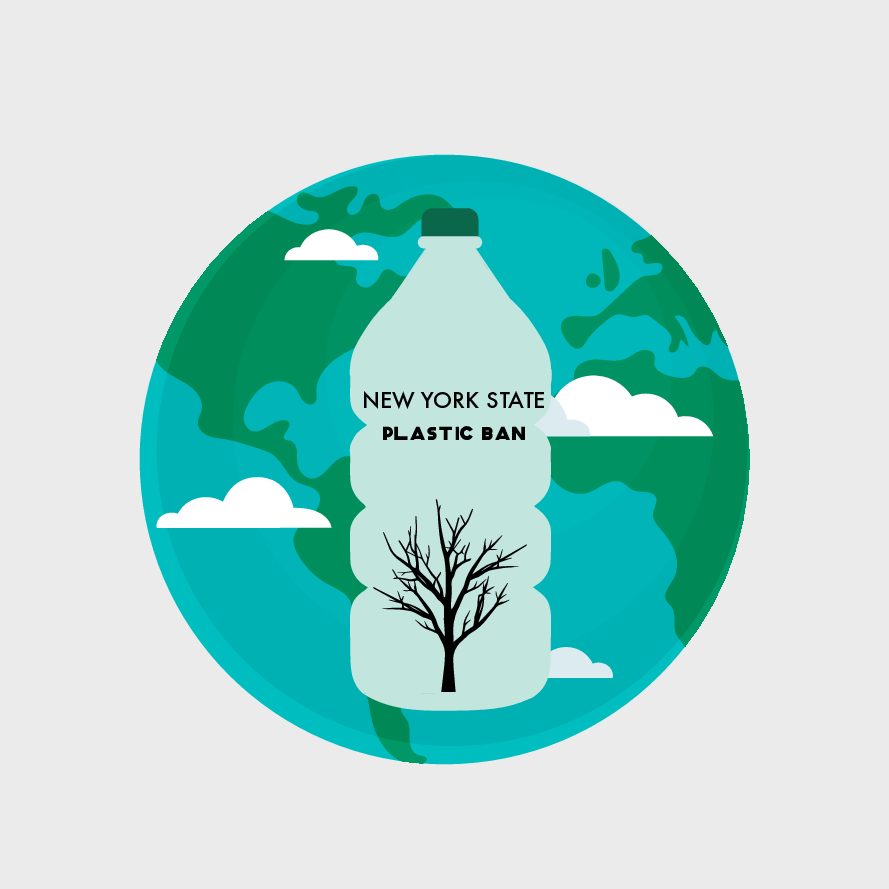Paper or plastic? Retail workers won’t be able to pose the question anymore — because customers won’t have an option starting this Sunday.
The state-wide ban on single-use plastic bags in New York, passed by lawmakers last April, is quickly approaching, and stores are beginning to transition from plastic to paper. It will be the second bag-ban in U.S. history behind California.
In Albany, Senate legislators approved the ban by a vote of 39 to 22 and the assembly by 100 to 42. Specifically aimed at reducing pollution in waterways, landfills and factory emissions, the law will disallow businesses from distributing any type of thin plastic bags to consumers.
Plastic material has been at the center of a partisan environmental degradation debate, and many argue that these bags aren’t biodegradable, kill aquatic life and the Earth’s ozone layer.
Included in the 10 bills that comprise the state’s proposed $175.5 billion budget, Gov. Cuomo made a public statement about the ban saying, “These bags have blighted our environment and clogged our waterways.”
The plastic bags have also been causing an issue of sustainable recycling. According to Department of Sanitation Commissioner Kathryn Garcia, about 10 billion plastic bags are discarded in New York City annually, and sanitation workers pick up more than 1,700 tons per week.
The amount of discarded plastic has gotten out of control.
For these reasons, customers will now be given the option to either purchase a reusable bag, pay a five-cent fee for a paper bag, or bring their own. In an effort to combat environmental change, the revenue from these fees will benefit New York State’s Environmental Protection Fund, and will in turn go toward funding for reusable bags. The fund is also used to expand the state Forest Preserve, restore historic sites and upgrade sewage treatment plants.
Even if it is seen as a small fee, residents that qualify and are using the Supplemental Nutrition Assistance Program for Women, Infants and Children to pay, won’t have to pay the fee in any county.
NYC businesses will be required to charge the small five-cent fee, along with the counties of Albany, Tompkins, Suffolk and Ulsters.
“It’s great for the environment,” sophomore Alexander Small said, discussing the PSU plastic bag ban enacted in 2018. “But I feel like there should be some alternative for students who live off campus. You don’t always know if you’re gonna buy something in the [ACC Express].”
Some of these alternatives Small suggested was repurposing shipment boxes and giving them to students, instead of having to pay for a reusable bag if they can’t afford it.
IAccording to The Department of Environmental Conservation website, the legislation will affect all clothing stores, convenience stores, food service establishments, grocery stores, liquor stores, hardware stores, office supply stores, drug stores and pharmacies, with the exception of plastic bags to hold prescriptions. These stores aren’t required to provide any bags at all for consumers to buy. If they do, the reusable bag must be machine-washable with at least one strap, be able to hold 22 pounds and be used over 125 times without the plastic breaking.
What are college students supposed to do when they forget their reusable bag at home, and the store either doesn’t offer reusable or paper bags, they’re too expensive, or they don’t have enough to pay the paper bag fee?
Legislators are now trying to address climate change, water scarcity and pollution in one of the largest states in the country. The 19.5 million residents must now shift to sustainable and energy efficient products. There are still exceptions to the ban that will have a direct affect on combating pollution. These exceptions include trash bags, food storage bags, bags provided by carry-out, bulk item packaging and bags containing raw meat.
So it clearly isn’t a full plastic ban.
The reusable bags are still plastic, and those small items with non-biodegradable plastic will build up eventually. And the paper bag alternative — isn’t sustainable.
The mass distribution of paper bags may make environmental degradation worse.
Processing paper bags involves clear-cutting trees, resulting in massive habitat destruction, ecological interruption and long term wildlife effects. The machinery requires fossil fuel usage, which further degrades the ozone layer. The entire process requires thousands of gallons of clean water, after the wood goes through a three-year dry stage and pulp transformation. The processes put into making these paper bags will only do more damage.
The ban will only cause more turmoil unless it is a full ban on plastics.
The DEC is getting ahead of itself, and fails to take into consideration that the only true sustainable resource is reusable, repurposed fabric bags that have little to no environmental impact.
New York’s plastic bag ban is a minimal step, in a sea of many needed for a real green alternative.
Email Jess Johnson at cp@cardinalpointsonline.com



